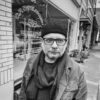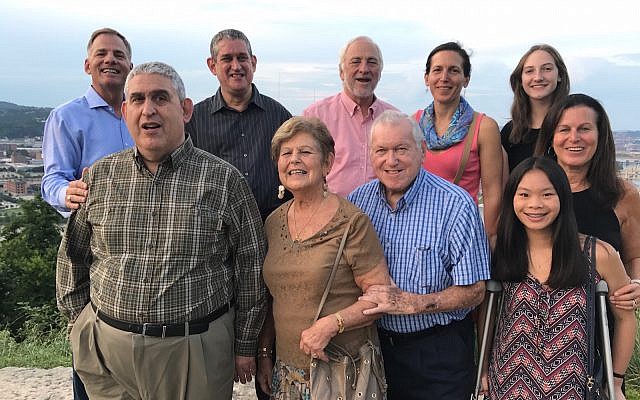On Monday, the first day of the sentencing phase of the synagogue shooter’s trial, the jury heard about four of those who were murdered during Shabbat services in the Tree of Life building.
Richard Gottfried and his sister Carol Black enjoyed going to the University of Pittsburgh football games together. Margaret “Peg” Durachko spoke of Gottfried’s love of wine, his dental patients who traveled across state lines to see him, and his life’s motto: “We’re going to do this while we can.”
Diane Rosenthal told of her brothers, Cecil and David, and their love of the family. Their mother recorded a message saying, “A big part of me died on Oct. 27, 2018. I woke up with two loving boys and went to bed with only memories.”
Jodi Kart found a card her father, Mel Wax, bought for her birthday when she went to clean out his apartment after his murder. It was signed, “I love you very much.”
In testimony that was at times dramatic, witnesses described the lives of their loved ones murdered in the Tree of Life building. In turns mundane, humorous and sad, the jury learned in vignettes and photos of the void left by the deaths of the victims and the struggles endured since the shooting.
Judge’s instructions
U.S. District Judge Robert Colville spent the first 45 minutes of the day instructing the jury on what they would hear during this phase of the trial and how they should determine whether the shooter, Robert Bowers, should be sentenced to death.
A federal life sentence, he explained, offered no opportunity for parole. He said it was up to each juror to decide individually if the convicted murderer deserved the death penalty.
The government already proved four aggravating factors in the death penalty eligibility phase. It would be presenting additional factors in the sentencing phase, including that the killing was motivated by religious animus and that the killer had a lack of remorse.
The defense, he said, would be arguing 112 mitigating factors they believed should prevent a death sentence, including evidence of a traumatic childhood, suicide attempts, and several stays in mental hospitals as a youth.
The government’s case
In her opening statement, Assistant U.S. Attorney Nicole Vasquez Schmitt noted that the defendant had decided to kill “again and again and again,” 11 times in total.
“He wanted to kill Jews,” she said. “He hated Jews. He wanted to kill as many as he could.”
She said that the jury had found him guilty, found him eligible for the death penalty, and now, it was time to hold him accountable for his crimes.
As for the defense’s mitigating factors, she said, the jury should not be persuaded by the large number the defense was setting out to prove.
“A single boulder outweighs a hundred grains of sand,” she said.
The prosecution, she said, will be asking the jury to “return a verdict of death, a verdict of justice.”
Defense’s opening statement
Defense attorney Elisa Long said the jurors had a moral decision to make — if “a fellow human being, a citizen, should live or die.”
Her opening statement attempted to present the convicted killer as a victim of an abusive and neglectful family, poor genes and mental health issues.
And, while he still holds the same repugnant and unrepented views he had on Oct. 27, 2018, she acknowledged, executing him would deny him the opportunity of rehabilitation.
Long told the jurors the defense would “ask each of you to look deep in your heart and conclude enough is enough. There has already been enough death, and another won’t make things right.’”
The victims: Richard Gottfried, 65
Carol Black was the first government witness. She recounted the life of her brother, Richard Gottfried, saying that he was a man of deep faith and someone who enjoyed physical activity.
A member of New Light Congregation, Gottfried became more religious after the death of their father, Black said. It was following an injury she suffered while running that Gottfried persuaded her to become more involved with the congregation as well.
“He was warm and loving, a good friend, very generous and kind. Everyone who knew him loved him,” she said.
Gottfried’s widow, Margaret “Peg” Durachko, testified that they were married 38 years and that they began dating in dental school.
“He caught my eye,” she said.
The two started a dental practice together in 1984. It remained open until his murder.
She said they volunteered with Catholic Charities, providing dental services to those who couldn’t afford it, and worked at the Squirrel Hill Health Center.
The interfaith couple also served as mentors to other couples through a Catholic marriage support group, she said.
“We expected to live to an old age,” Durachko said, “but we did a lot while we could. At least I have those memories.”
Pausing as she became emotional, she then said, “He was my whole family. We never had children. It was wiped out in a second.”
Cecil Rosenthal, 59, and David Rosenthal, 54
Cecil and David Rosenthal were born with a genetic disorder called Fragile X, their sister Diane Rosenthal testified. The family was urged to institutionalize her brothers because of the difficult journey ahead but her parents refused.
That journey, she said, was often difficult and sometime embarrassing, but “it was probably the best thing that ever happened to me and my family.”
Cecil, she said, was very sociable and always smiling. He had a strong connection to their father and enjoyed learning about the family.
David was more shy but very friendly once you got to know him, she said. He loved spending time at the fire station near the group home where he lived with his brother and was extremely close to his mother.
Both of her brothers, she said, were wonderful uncles to her two daughters.
Their deaths, she said, changed her life — “the “boys” were the glue that held the family together.
“I cry a couple of times a week,” she said. “My parents cry every day.”
Diane said that her parents were unable to emotionally or physically come to the courthouse to testify. Instead, their mother, Joy Rosenthal, recorded a statement.
After recounting their lives, and the happiness the brothers found at Tree of Life, through tears she concluded: “My only hope is that they are in peace. May their memories be a blessing.”
Mel Wax, 87
Jodi Kart, Mel Wax’s daughter, said she spoke to her father at least once a day. The calls, she said, become more frequent after the death of her mother.
Her father was a veteran who had served in Korea and spent time in Germany. He was uncomfortable in the Germany, she said, because of the Holocaust, and he often asked her not to tell people she was Jewish or to show outward symbols of their faith and heritage.
Deeply religious, her father was a former officer and president at New Light.
When she thinks of her father, she said, the first words that come to her mind are “unconditional love.”
“I have no memories of him raising his voice in anger. I knew to my core how much he loved me,” she said.
She called her loss “devastating.”
“He never got to see our son graduate from college,” she said. “He never got to see his first job out of college or the work he does. I’ll never know how long he might have lived. I’ll never know what he might have died from,” she said.
SWAT Officer Anthony Burke
Anthony Burke was shot in the hand by the shooter during the attack at the synagogue.
He testified about his many operations and failed attempts at rehabilitation before finally having tendons from his leg put in his hand. That helped, he said, but he still experiences numbness and loss of strength. He struggles with fine motor skills.
“Buttoning my top button is now permanently my wife’s job,” he said.
Fighting back tears, he told of the depression he felt after the attack and his fear of letting his other SWAT members down.
“The injury to my hand,” he said, “is something I’m going to have to live with and try to explain to my kids.”
Special Agent Samantha Bell also testified. She discussed the defendant’s emails to his mother and the antisemitic content of those messages.
The trial continues Tuesday.
Related story: Resources are available to ease trauma during synagogue shooting trial.
This story is part of ongoing coverage of the Pittsburgh synagogue shooting trial by the Pittsburgh Jewish Chronicle and the Pittsburgh Union Progress in a collaboration supported by funding from the Pittsburgh Media Partnership.



